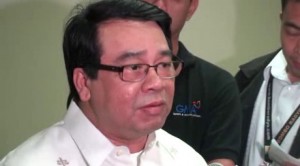Militant legislators bringing PH-US pact to SC
MANILA, Philippines—The militant Bayan Muna party-list group said Sunday it would question in the Supreme Court (SC) the constitutionality of a new defense pact with the United States which the Aquino administration is expected to sign when President Barack Obama visits the Philippines later this month.
Bayan Muna Rep. Neri Colmenares criticized the Aquino administration for being in a “mad rush” to finish the Agreement on Enhanced Defense Cooperation (AEDC) in time for Obama’s visit on April 28 and 29, saying the pact was “worse than the Bases Treaty rejected by the Philippine Senate in September 1991.”
“Simply put, it is like a dog’s welcome gift to his master. They are trying to move heaven and hell so that Obama would be here for the signing of the AEDC,” said Colmenares in a statement.
“The AEDC will practically bring back US military bases to the Philippines without a treaty, without rent and without limits as the Americans may use all the Philippine military facilities.”
Colmenares said Bayan Muna was preparing a case to question the AEDC in the Supreme Court for violation of Article II of the Constitution, particularly Sections 3 (Civilian Supremacy over Military Authority) and 7 (the State’s Pursuit of an Independent Foreign Policy), and possibly, Section 8 (Ban on Nuclear Weapons).
Article continues after this advertisement“This is not a mere executive agreement but a treaty and should be scrutinized by the Senate and the House of Representatives,” Colmenares said.
Article continues after this advertisementThe Department of Foreign Affairs said it expected to conclude negotiations on the AEDC with the US before Obama’s visit, which is part of the American president’s four-nation tour of East Asia.
Defense Undersecretary Pio Lorenzo Batino, chief Philippine negotiator, said the AEDC—which would allow more lenient access for more US troops, aircraft and ships, and provide for warehousing of their equipment for quicker mobilization—was meant to provide “critical and timely support to the modernization of the Armed Forces of the Philippines (and the) achievement of the country’s minimum credible defense posture.”
The agreement comes amid a widening conflict with China over territorial claims in the West Philippine Sea.
Calling the shots
But Colmenares gave little credence to defense officials’ assurances that the AEDC would ensure full respect for Philippine sovereignty; that there would be no permanent bases or troop deployment in the country; and absolutely no nuclear weapons would be allowed.
“We all know that these can be circumvented by the fact that in reality it is the US government that is the one calling the shots and not the Aquino administration,” said Colmenares.
For example, Colmenares said that Washington could help the Philippine government construct a military base in every province through military aid but it would have “unlimited” access to these military facilities under the AEDC.
“This would also be the framework for the existing bases, in paper it is a Philippine base but in reality it is a US base,” he said.
Bayan Muna Rep. Carlos Zarate also questioned how Filipinos could be sure that US forces would not bring nuclear weapons into the country when the US government maintains a neither-confirm-nor-deny policy if their ships or planes carry nuclear weapons.
Zarate warned the presence of nuclear weapons in the country “will make us a prime target of US enemies.”
“They already found a way to circumvent the constitutional ban on the presence of foreign troops in the country through the Visiting Forces Agreement (VFA) but now they will further maximize this and increase US troop presence in the country. So in truth the AEDC is a very deceptive deal,” said Zarate.
Responding to the criticism, Malacañang reiterated on Sunday that the Philippines was not rushing the new defense agreement in time for Obama’s visit.
Communications Secretary Herminio Coloma maintained that members of the government panel negotiating with their US counterparts were under no “deadline” to complete work on the enhanced defense cooperation (EDC).—With a report from Christian V. Esguerra
